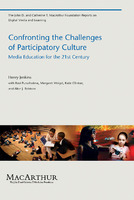Confronting the Challenges of Participatory Culture
Media Education for the 21st Century
Abstract
Many teens today who use the Internet are actively involved in participatory cultures—joining online communities (Facebook, message boards, game clans), producing creative work in new forms (digital sampling, modding, fan videomaking, fan fiction), working in teams to complete tasks and develop new knowledge (as in Wikipedia), and shaping the flow of media (as in blogging or podcasting). A growing body of scholarship suggests potential benefits of these activities, including opportunities for peer-to-peer learning, development of skills useful in the modern workplace, and a more empowered conception of citizenship. Some argue that young people pick up these key skills and competencies on their own by interacting with popular culture; but the problems of unequal access, lack of media transparency, and the breakdown of traditional forms of socialization and professional training suggest a role for policy and pedagogical intervention.This report aims to shift the conversation about the "digital divide" from questions about access to technology to questions about access to opportunities for involvement in participatory culture and how to provide all young people with the chance to develop the cultural competencies and social skills needed. Fostering these skills, the authors argue, requires a systemic approach to media education; schools, afterschool programs, and parents all have distinctive roles to play.The John D. and Catherine T. MacArthur Foundation Reports on Digital Media and Learning
Keywords
online media; youthISBN
9780262513623OCN
1100541598Publisher
The MIT PressPublisher website
https://mitpress.mit.edu/Publication date and place
Cambridge, 2009Classification
Educational equipment and technology, computer-aided learning (CAL)
Impact of science and technology on society


 Download
Download